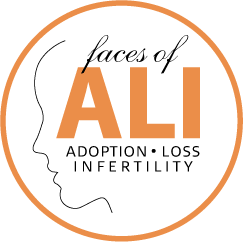The Ricki Lake Show, since airing today’s show, has been responsive to the ALI community, and has shown an eagerness to talk more about infertility in the open. I welcome and appreciate this chance for dialogue and hope it will raise awareness! This is being cross-posted over on The Ricki Lake Show blog…check it out!
Today I wanted to talk about my series, Faces of Adoption/Loss/Infertility (ALI), which is an attempt to spotlight a disease that 1 in 7 of Americans suffer from. And yet, it is rarely spoken about. Infertility could be affecting people you know, but they may be afraid to share the details with you, because of fear of being criticized or misunderstood.
Details like this:
— Your neighbor might be like Courtney Cheng. She was thrilled to become pregnant in 2010, after marrying her husband in a fairytale wedding. At the time she said:
“I’m feeling all kinds of emotions. A little scared for how much our life is going to change, excited to go on this journey only given to women, I’m even looking forward to watching my body change. (I say this now still looking exactly the same way I did a month ago!)
By June 2011, she had experienced four miscarriages and had no clear answers from doctors as to why. She was devastated. Her spirit forever changed, she said:
“Even when I’m covering up the sad like today, I still just want to be pregnant. I want to be having the baby that I’m not having any more, who is buried beneath a tree. It’s just not fair.”
Something amazing happened to Courtney this year. You can click here to read about her story.
— Your cousin might be like Sarah, a young woman in her twenties, married and ready to have a family. But after trying for a baby for two years with no results, she was diagnosed with endometriosis, an extremely painful condition that also effects fertility. After two surgeries and thousands of dollars spent on operations to correct the constant pain she was in, she decided to look into adoption.
She was quickly matched with a birth mother. But she soon learned that the expenses for her adoption would exceed $30,000! Frantic to complete the adoption before the baby was born, friends and family held online auctions and she investigated tax codes and selling their home to boost their savings. She and her husband had to figure out a way to raise thousands of dollars in a few months. What happened? Did she adopt the baby? Click here to find out.
— Your friend might be like Leah. Leah was diagnosed with Stage IV endometriosis as a young single woman and was faced with a hard choice: should she pursue fertility treatments now while she was still young, which was her only chance to become a biological mother? How would she handle dating? Would she feel alone and isolated pursuing treatments? You can click here to hear about Leah’s journey, and find out what path she finally chose.
I’m hoping by reading these stories, people can understand more about infertility, which effects 7.3 million Americans. Possibly, your neighbors, your friends, your relatives.
Thank you.



You are incredible. That is all.
This is brilliant. Well done for reaching more of the public eye. This is the real stories!
Thanks for all you do, lady!
Love this. Love it, love it, love it.
*standing ovation*
As we were preparing ourselves for the possibility of IVF, we got very lucky and had a spontaneous pregnancy. Unfortunately, our baby had a lethal birth defect and there was not going to be a happy ending. We had to start again. This meant that upon entering IVF, we had all the emotional baggage that goes with infertility along with the misery that is unique to those who have lost a pregnancy. There are many women who go through far worse before IVF, but whatever your situation, pain is pain. I would never advocate comparison or ranking struggles, although I will admit I often used to peek around the waiting room of my clinic and wonder why the very young-looking lady with the snazzy red shoes was there, or why blue-shirt woman looked so sad that day. But I’m quite nosy. Most people read the magazines, or at least pretend to read them.